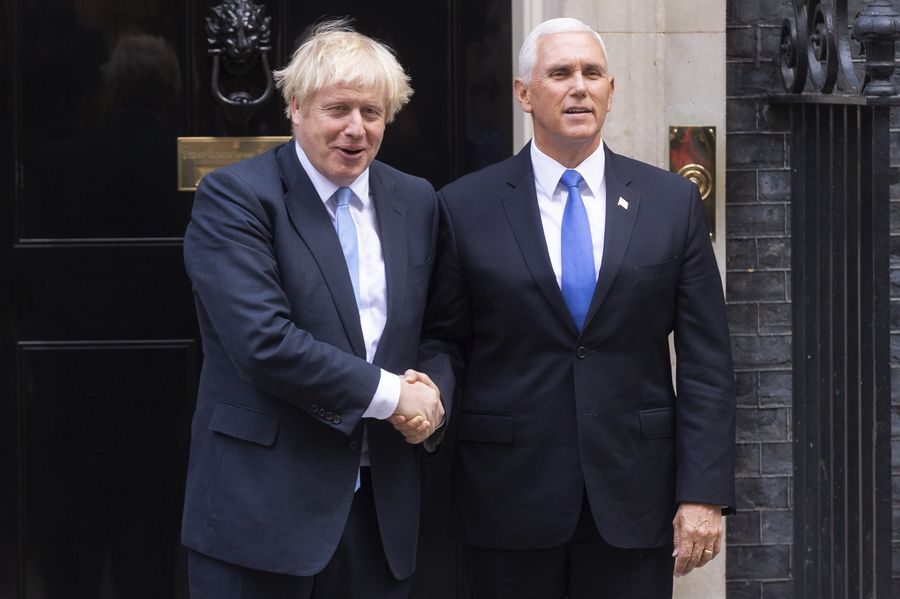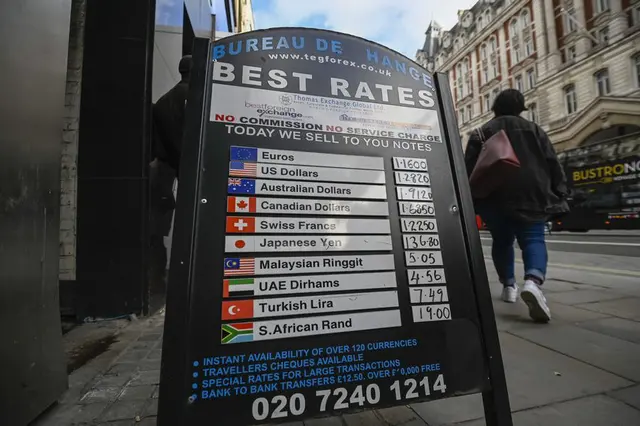A pedestrian walks past a currency exchange in London, Britain, on Feb. 1, 2020.(Photo by Stephen Chung/Xinhua)
Despite the strong political will to forge a trade deal, observers are not as optimistic about the prospects for the Britain-U.S. trade talks.
**"The UK get some sort of sweetheart deal from (U.S. President Donald) Trump," Tim Bale, professor of politics at Queen Mary University of London said, but trade deals are "about the maths not the chemistry". **
LONDON, March. 2 (Xinhua) -- The British government published Monday its negotiating objectives for a free trade agreement with the United States, with talks and "hard bargain" expected to begin this month.
Once an "ambitious and comprehensive free trade agreement" is agreed, manufacturers of ceramics, cars and food and drink, and professional services including architects and lawyers are expected to be the "biggest winners" from tariff free access to the U.S. market, said the Department for International Trade (DIT) in a statement.
"We're going to drive a hard bargain to boost British industry. Trading Scottish smoked salmon for Stetson hats, we will deliver lower prices and more choices for our shoppers. Most importantly, this transatlantic trade deal will reflect the unique closeness of our two great nations," said Prime Minister Boris Johnson.
The DIT said the agreement will deliver for the whole of Britain, with Scotland and the northeast and midlands regions of England forecast to benefit most from removing barriers to trade with the United States.
According to a government analysis, British economy will benefit from a 3.4 billion pounds (about 4.34 billion U.S. dollars) boost, as the trade deal will increase transatlantic trade flows by 15.3 billion pounds (19.6 billion dollars).
Speaking of the digital trade issue, the statement noted that the deal will include "a chapter on digital trade", to maximise opportunities for businesses to trade digitally between the two sides.

File photo shows British Prime Minister Boris Johnson (L) greeting U.S. Vice President Mike Pence at 10 Downing Street in London, Britain, on Sept. 5, 2019.(Photo by Xinhua/Ray Tang)
Johnson said his country has the best negotiators to secure a deal to boost British industry.
On the British side, talks will be overseen by Crawford Falconer, the DIT's chief trade negotiation adviser. Falconer was New Zealand's former chief negotiator and ambassador to the World Trade Organization (WTO). The trade talks will alternate between Britain and the United States.
"This deal with our biggest single trading partner will cut red tape for our small businesses, cut tariffs for our great products from dairy to cars and increase growth in all four nations," said International Trade Secretary Liz Truss.
Despite the the government promise to "protect our NHS (National Health Service) and uphold high standards on food safety and animal welfare", the upcoming trade deal talks with the United States have raised worries among some British industries, particularly from farmers and food producers for fearing that Britain's farm standards might be compromised.
Last week, National Farmers Union's President Minette Batters urged the government to show global leadership and defend British farm standards as the benchmark for any food imports in future trade deals.
"This year the government must...insist that UK farm standards are the benchmark for climate-friendly farming around the world and that whoever wants to trade with us, trades on our terms," said Batters in her keynote speech during the union's annual conference in Birmingham. She has warned that U.S. farms could "outcompete" British producers if standards were compromised.
Despite the strong political will to forge a trade deal, observers are not as optimistic about the prospects for the Britain-U.S. trade talks.
When Britain is outside the EU, the country might have declining voice on the negotiation table with countries like the United States, argued Peter Holmes, fellow of the UK Trade Policy Observatory, an independent group that analyses trade policy proposals for Britain.
Tim Bale, professor of politics at Queen Mary University of London and deputy director at UK in a Changing Europe, also doubted that the two countries could secure a trade deal in the near future, given the "massive imbalance" in power between the two countries.
"The UK get some sort of sweetheart deal from (U.S. President Donald) Trump," he said, but trade deals are "about the maths not the chemistry".
The British government will shortly set out negotiating objectives for Australia, Japan and New Zealand, with the aim of having 80 percent of total British external trade covered by free trade agreements by 2022, the DIT said.
 简体中文
简体中文

